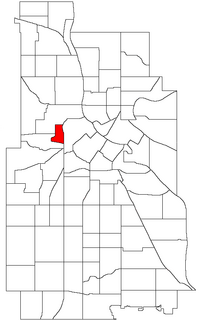Sumner-Glenwood, Minneapolis facts for kids
Quick facts for kids
Sumner-Glenwood
Heritage Park
|
|
|---|---|
|
Neighborhood
|
|

Location of Sumner-Glenwood within the U.S. city of Minneapolis
|
|
| Country | United States |
| State | Minnesota |
| County | Hennepin |
| City | Minneapolis |
| Community | Near North |
| City Council Ward | 5 |
| Area | |
| • Total | 0.22 sq mi (0.6 km2) |
| Population
(2020)
|
|
| • Total | 2,003 |
| • Density | 9,100/sq mi (3,520/km2) |
| Time zone | UTC-6 (CST) |
| • Summer (DST) | UTC-5 (CDT) |
| ZIP code |
55411
|
| Area code(s) | 612 |
| Historical population | |||
|---|---|---|---|
| Census | Pop. | %± | |
| 1980 | 2,095 | — | |
| 1990 | 3,336 | 59.2% | |
| 2000 | 144 | −95.7% | |
| 2010 | 1,637 | 1,036.8% | |
| 2020 | 2,003 | 22.4% | |
Sumner-Glenwood is a neighborhood located in the Near North part of Minneapolis. It's like a small town within the big city! This neighborhood is about 15 city blocks big. It's bordered by 11th Avenue North to the north, Glenwood Avenue to the south, and Interstate 94 to the east. On the west, you'll find Girard Terrace and Emerson Avenue North. A special part of this neighborhood is called Heritage Park. It has different kinds of buildings and homes. The neighborhood is in Ward 5, and its city council member is Jeremiah Ellison.
Contents
Who Lives in Sumner-Glenwood?
This section tells us about the people who call Sumner-Glenwood home.
How Many People Live Here?
In 2020, about 2,768 people lived in Sumner-Glenwood. Slightly more than half of the residents were female. Most people (over 80%) had finished high school or an equivalent.
Different Backgrounds and Languages
About one-fifth of the people living here were born in other countries. Many residents (over 40%) speak a language other than English at home. This makes the neighborhood a very diverse and interesting place!
How People Travel and Live
Most workers (about 85%) travel to their jobs by car. The average household income in Sumner-Glenwood was about $39,609. Many homes in the neighborhood (about 63%) are rented, not owned.
A Look at the Community's Diversity
The table below shows the different groups of people living in Sumner-Glenwood in 2020.
| Race/ethnicity | Share of total population (2020) |
|---|---|
| Total | 100% |
| One race | 96.6% |
| White | 12.2% |
| Black or African American | 78.5% |
| American Indian and Alaska Natives | 0.8% |
| Asian | 2.5% |
| Hispanic | 2.4% |
| Native Hawaiian and Other Pacific Islander | 0.1% |
| Other | 0.2% |
| Two or more races | 3.4% |
History of Sumner-Glenwood
This neighborhood has a unique history, especially with its housing and community changes.
Early Housing Projects
The Sumner Field Homes were built in 1938. These were the very first homes in Minnesota that received special funding from the government to help people afford them. They were built by the WPA, a program that created jobs during a tough economic time. Later, in the 1960s and 1970s, more tall apartment buildings were added.
Big Changes in the Late 1990s
In 1998, the original Sumner Field Homes and the taller apartment buildings were taken down. This was a huge change for the neighborhood. Because of this, the number of people living there dropped a lot. For example, in 1990, there were over 3,300 residents, but by 2000, there were only about 144 people left.
Building a New Community: Heritage Park
After the old buildings were removed, there were plans to rebuild the area. The idea was to connect it better with the streets around it. New buildings were designed in a style called "New Urbanism." This style mixes different types of homes, like affordable ones and others that are sold at market price.
This new community was named Heritage Park. It was built with help from special grants called HOPE VI. Heritage Park now has homes for rent and homes for sale, for people with different incomes. One of the new streets in this area is named Van White Memorial Boulevard. It honors Van Freeman White, who was the first African-American person to serve on the Minneapolis City Council.
Today, the Heritage Park Master Association helps represent the people who own single-family houses, townhouses, and condominiums in the neighborhood.

